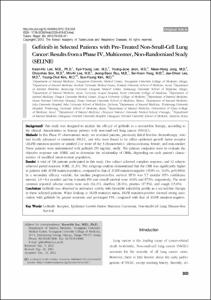KUMEL Repository
1. Journal Papers (연구논문)
1. School of Medicine (의과대학)
Dept. of Internal Medicine (내과학)
Gefitinib in Selected Patients with Pre-Treated Non-Small-Cell Lung Cancer: Results from a Phase IV, Multicenter, Non-Randomized Study (SELINE)
- Keimyung Author(s)
- Jeon, Young June
- Department
- Dept. of Internal Medicine (내과학)
- Journal Title
- 결핵 및 호흡기 질환
- Issued Date
- 2012
- Volume
- 73
- Issue
- 6
- Abstract
- Background: This study was designed to analyze the efficacy of gefitinib as a second-line therapy, according to
the clinical characteristics in Korean patients with non-small-cell lung cancer (NSCLC).
Methods: In this Phase IV observational study, we recruited patients, previously failed first-line chemotherapy, who
had locally advanced or metastatic NSCLC, and who were found to be either epidermal growth factor receptor
(EGFR) mutation-positive or satisfied 2 or more of the 3 characteristics: adenocarcinoma, female, and non-smoker.
These patients were administered with gefitinib 250 mg/day, orally. The primary endpoints were to evaluate the
objective response rate (ORR) and to determine the relationship of ORRs, depending on each patient's characteristics
of modified intent-to-treat population.
Results: A total of 138 patients participated in this study. One subject achieved complete response, and 42 subjects
achieved partial response (ORR, 31.2%). The subgroup analysis demonstrated that the ORR was significantly higher
in patients with EGFR mutation-positive, compared to that of EGFR mutation-negative (45.8% vs. 14.0%, p=0.0004).
In a secondary efficacy variable, the median progression-free survival (PFS) was 5.7 months (95% confidence
interval, 3.9∼8.4 months) and the 6-month PFS and overall survival were 49.6% and 87.9%, respectively. The most
common reported adverse events were rash (34.4%), diarrhea (26.6%), pruritus (17.5%), and cough (15.6%).
Conclusion: Gefitinib was observed in anti-tumor activity with favorable tolerability profile as a second-line therapy
in these selected patients. When looking at EGFR mutation status, EGFR mutation-positive showed strong association
with gefitinib by greater response and prolonged PFS, compared with that of EGFR mutation-negative.
Key Words: Gefitinib; Receptor, Epidermal Growth Factor; Mutation; Carcinoma, Non-Small-Cell Lung; Disease-Free
Survival
- Keimyung Author(s)(Kor)
- 전영준
- Publisher
- School of Medicine
- Citation
- Kwan-Ho Lee et al. (2012). Gefitinib in Selected Patients with Pre-Treated Non-Small-Cell Lung Cancer: Results from a Phase IV, Multicenter, Non-Randomized Study (SELINE). 결핵 및 호흡기 질환, 73(6), 303–311. doi: 10.4046/trd.2012.73.6.303
- Type
- Article
- ISSN
- 1738-3536
- Appears in Collections:
- 1. School of Medicine (의과대학) > Dept. of Internal Medicine (내과학)
- 파일 목록
-
-
Download
 oak-bbb-00152.pdf
기타 데이터 / 403.49 kB / Adobe PDF
oak-bbb-00152.pdf
기타 데이터 / 403.49 kB / Adobe PDF
-
Items in Repository are protected by copyright, with all rights reserved, unless otherwise indicated.